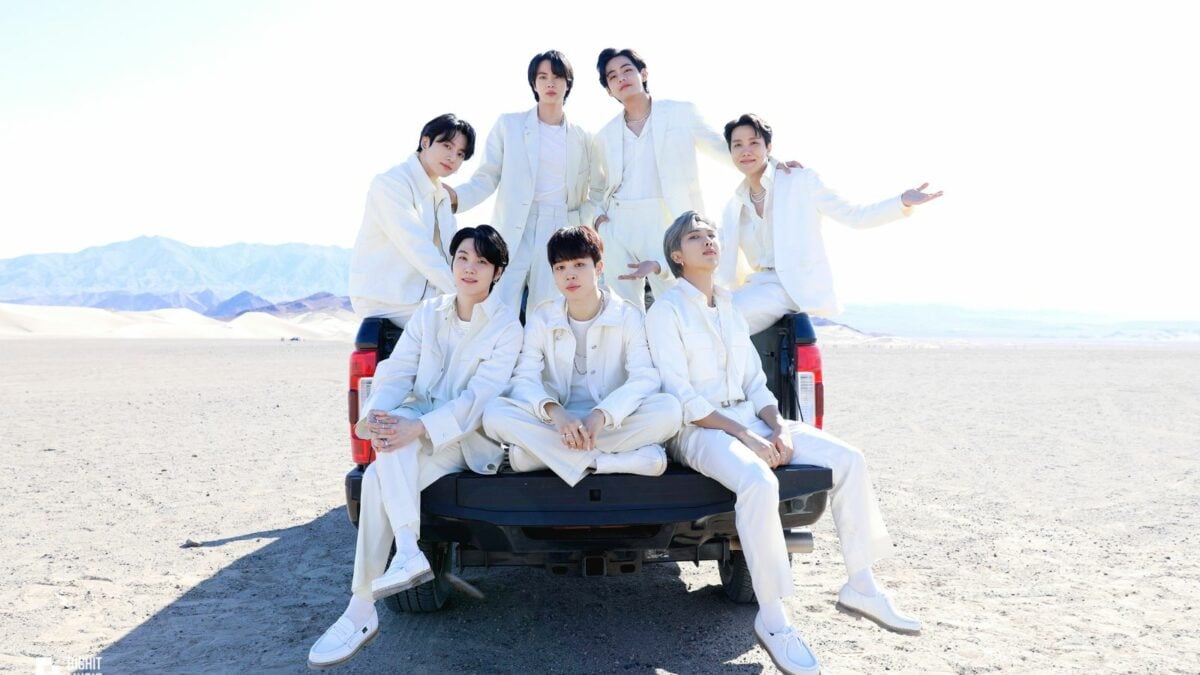Early Monday morning, the label behind the superstar global South Korean group BTS announced the upcoming members’ enlistment in the South Korean obligatory military service to be underway. Through an official statement posted on Twitter and Weverse, HYBE finally confirmed the consensual and final decision regarding one of South Korea’s most significant economic contributors, officiating their future conscription to take place in the coming years, starting with the oldest member Jin, who is expected to go after completing the promotion schedule for his solo single set to be released at the end of October.
In South Korea, every able-bodied man between the ages of 18 and 28 must enlist in the military for 18 to 21 months, due to the imminent risk of war as a consequence of the country’s ongoing conflict with North Korea. The tension between the two Korean countries forced the government to take precautions in 1957, aiming to ensure the military will continuously remain full and with capable men. Nonetheless, South Korea has a decade-long precedent for exempting extraordinary actors, athletes, dancers, and musicians from enlistment upon demonstrating exceptional skill in their field. The current exemption laws date back to 1988 when the mandate was adjusted for the first time, allowing athletes who medal in the Olympics or award-winning classical musicians to avoid military conscription. Popular culture-art figures are not included in that bill.
As a consequence of BTS’ international success and influence, a lingering question regarding the group has always been whether they would be exempt from military conscription or not. The South Korean 7-member-group has been awarded around 400 times throughout the course of their career, becoming the most-awarded group in BBMA history as of 2022 and the only K-Pop group to have ever been nominated for a Grammy. In spite of all the evidence pointing at BTS’ extraordinary skill, it seems as though the South Korean Government deemed it insufficient.
BTS military service debate and consequences

BTS first debuted in 2013, earning a small yet loyal fanbase through their eye-grabbing and unique hip-hop sound not seen prior in K-Pop. Since then, BTS’ popularity exponentially grew in South Korea, gaining international success after the release of their 2017 hit single “DNA”. Since then, the group’s immense talent has gathered the hearts of millions of fans worldwide. With a fanbase considered to be larger than that of The Beatles and Michael Jackson, BTS opened the doors to South Korea and its economy.
As the group members grew older, more and more discussions arose regarding the members’ obligatory service, and whether they would qualify for the exemption or not. BTS stirred the world, and the South Korean Government took note of the enormous influence the group was having worldwide — and more specifically — in the increase of the country’s monetary gains. In an unprecedented event, governmental meetings regarding the group became a regular occurrence at the South Korean Assembly Proceeding Hall, discussing BTS’ future – especially as the oldest members grew closer to their enlisting age.
Without ever reaching a consensus opinion, the government continuously accepted the request for postponement for BTS’ Jin, the oldest member who is now 29 years old, delaying the decision-making process for the remaining time. The constant postponement of a decision regarding the group’s activities resulted in the population and the fans growing antsy and revolting over the lack of a verdict. The government, much like the masses, has been in a constant debate with divergent opinions regarding the situation, with some vehemently believing the group should undoubtedly honor their dedication to the nation through military conscription.
The heated discussion and constant indecision became yet again a hot topic when the group announced their group activities postponement in June. In an emotional video, BTS announced the decision to cease group activities to a minimum, albeit not a hiatus, aiming to pursue their own musical individualism through solo work for the upcoming months or years. This would cause an instant reaction from the Government, who urged HYBE and BTS to continue their activities as a group in fear of an economic collapse – BTS is responsible for $3.6 billion dollars to the South Korean economy, with an estimated additional value of $1.1 billion of consumer goods exports related to BTS. The group did not acknowledge the request, continuing with the break from activities.
On Oct. 15, BTS held a concert in Busan as a way to reunite with fans across the globe, and more specifically, with the faithful South Korean fanbase. In a concert to which more than 50,000 fans attended and 50 million others watched on live stream, BTS poured out their heart and souls, proving their worth to everyone attending – including Government officials who were at the concert assessing the group’s global influence and whether it would justify a military exemption. The official announcement came shortly after.
South Korea’s conscription alternatives for BTS
In spite of BTS’ constant proof of their global influence and international importance, evidenced by their yearly presence at the United Nations as Youth Ambassadors and as the official musical ambassadors for the FIFA World Cup 2022 in Qatar, the South Korean Government had an anticlimatic decision to the group and the fans’ appeal for exemption.
A bill introduced earlier this year by government officials allowed extraordinary idols to carry out an alternative service to the military stint – a bill also known as ‘BTS Law’. The South Korean pop group, as recipients of an Order of Cultural Merit in 2018, “Hallyu” would qualify under the bill – consequently with some masses doubting and questioning the fairness of military exemptions. Prior to the new bill, the government also weighed in on the possibility of holding a public survey to decide BTS’ fate, however, that idea was since dropped. Nevertheless, an opinion poll was held earlier this year, finding that about 60% of respondents were in favor of military exemption for BTS, which was a far greater number in comparison to a 2020 poll that weighed in on the pros and cons more evenly.
Not entirely willing to let go of the estimated $1 million tourists visiting South Korea bring in because of BTS every year, the government seemed to have been debating on giving BTS yet another alternative in exchange for military service: Ambassador Work. Earlier this year, the Busan Mayor admitted to proposing BTS an alternate gig as public relations ambassadors for his city’s bid to host the 2030 World Expo, hoping to host a competitive edge in the fiery competition against Rome, Odessa, and Riyadh.
“If BTS is allowed alternative military service, its members will be assigned with national duties as heavy as military service and will serve the nation in their unique capacity.”
During that same month, the country’s defense minister Lee Jong-sup suggested, during a parliamentary session, that by allowing BTS to continue performing even while serving, the military would be able to serve national interests without negative repercussions in the remaining areas of the industry.
“Even if they join the military, there would be a way to give them a chance to practice and perform together if there are scheduled concerts abroad as many people highly value [artists serving] in the military, that may help boost their popularity even more.”
In spite of the alternatives for the military conscription given in an almost desperate attempt to continue profiting from BTS, the government never exempted the group from their military duties, and the group did not back down either. In the official announcement provided by HYBE, the members admitted to being honored to fulfill mandatory military service until 2025, when all the members would be officially done with their military activities, proof of their refusal to become the governments’ official ambassadors in the future and thus, granting the group a little more liberty to work freely on their own craft.
As for what’s to come for BTS in the future — other than military service — BTS’ Jin is set to release his first solo work in the upcoming months. All the remaining members, with the exception of J-Hope who released his first solo album “Jack in the Box” in July, will also be releasing their solo work under HYBE, continuing with their musical endeavors until each member’s enlistment, and ensuring fans will continue having new music to look forward to.

